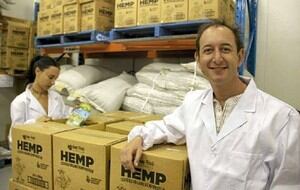Fearing that demand will outstrip supply from dispensaries and pharmacies, the government has stepped in to ensure that local consumers have access to domestic products, including hemp extracts that are not currently permitted for human consumption.
“[Canberra] recognises that there will be such a massive demand for medical cannabis, they are worried that we cannot keep up with demand here. They won’t actually let us export our products—yet,” says Paul Benhaim, chief executive of Elixinol, one of the world’s biggest growers, extractors, processors and manufacturers of whole-plant cannabidiol (CBD) extract sourced from industrial hemp.

Benhaim is waiting to satisfy licensing requirements before he can begin supplying medical cannabis in Australia, and also standing by for a food-safety ruling by a council of Australian state ministers in April on the status of hemp and its related products as a food and nutrition source.
Though based in New South Wales, he set up Elixinol in Colorado because legislation would not allow it in Australia. He says that the business has grown “astoundingly” in the last year in its main markets of America, Europe and Asia.
He speculates that it may even take a “couple of years” before the market calms down and supply meets demand in Australia—and exports can begin.
During this time the block on shipments means that hemp suppliers like Benhaim—the biggest in the Southern Hemisphere, also to supply his Hemp Foods business—will not be able to help plug global demand from his plantation in Australia.
“Until then, we will just be focusing on the Australian market for Elixinol, and in the rest of the world through our various regional entities,” he says.
Interest in CBD research has rocketed recently—if you look at the number of studies taking place over time, the data will show a hockey stick-shaped graph—and Elixinol has been central to much of this science.
Benhaim is often contacted by universities to join and support studies to look at the “many different ideas that we see are the future of this medicine”.
CBD is best known for its promising role in reversing epilepsy and cancer. In Australia, Elixinol came into the spotlight two years ago when a young girl was given it to counter her regular and severe epileptic seizures. Following nine years of surgeries and anti-epileptic drugs, her seizures ended after five days of taking CBD oil.
Australian officials have since approved its use for HIV, chemotherapy and nausea, while Benhaim’s company is engaged in research into everything “from pain and anxiety to multiple sclerosis, autism and anything related to inflammation”.
But first the politics of cannabis—concentrated among the state ministers—must catch up with the progressiveness of the TGA, Australia’s regulator of complementary medicines—hemp extracts included—which paved the way for cannabis to be legalised for medicinal use last year.
Only sold online in Australia through foreign-based companies like Elixinol, the chance that hemp’s regulatory status will change is high when the Coag council of state ministers debates whether to finally allow it as a food and nutrition ingredient.
Though the move has been on the agenda for the best part of a decade, it has regularly been held up by police concerns over the impact hemp consumption would have on roadside drugs tests. This stumbling block appears to have been cleared following new government research that gives the green light for hemp’s approval.
